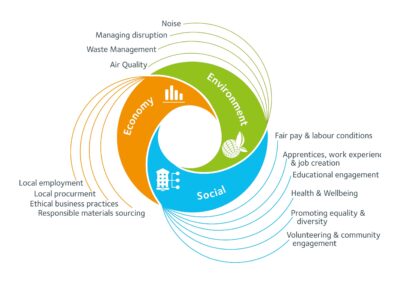
What Is Social Value?
Social Value became more relevant to stakeholders after the Public Services Act 2012 was introduced. The act is defined as “An Act to require public authorities to have regard to economic, social and environmental well-being in connection with public services contracts; and for connected purposes”.
It is the amount of impact a public authority brings to society and the community in which they operate in economically, socially, and environmentally. These factors are known as the three pillars of sustainability.
The economy factor can relate to employment within the local community, purchasing from local suppliers and both sourcing materials/undergoing business practices within an ethical manner.
Social factors include equal pay and labour conditions, advocating equality and diversity, health and wellbeing, volunteering and community engagement, educational engagement and job creation, as well as apprentices and work experience.
Finally, there are also multiple environmental factors such as the air quality, managing disruption, waste management and noise pollution.

Social value can be presented in various ways. Brighton & Hove City Council chose to address social value in a guide for all of their council officers, service commissioners, bidders and suppliers.
Gloucester City Council’s answer to social value is providing a detailed toolkit for their residents and communities.
Social Value UK is an organisation that operate with the purpose for educating people that values are not only financial but coincide with the three pillars of sustainability. Since formed in 2007, they have had the vision of “A world where organisations are accountable for their impact on people and where decisions are made to improve wellbeing, equality and the environment for everyone.”

